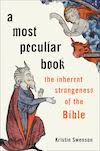Despite the Bible’s ubiquity, despite the Bible’s appearance as a book like any other on our twenty-first century shelves, despite its frequent citation in private and public discourse, the Bible regularly—on closer inspection—shatters our preconceptions and assumptions. This, I argue, is a very good thing for believers and non-believers alike.

A Most Peculiar Book: The Inherent Strangeness of the Bible
Kristin Swenson
Oxford University Press
February, 2021
I point this out not to exasperate but as one among many possible examples reminding all of us that the Bible actively resists literalistic application. On the contrary, the Bible demands of its readers equal measures of learning and humility, unfailingly applied. And that, I argue, is where the believing can start, if one is so inclined. It’s from that point, with that posture of engagement, the muscular application of mind and heart, that believers might encounter the Word of God and readers of other or no faiths can appreciate what an amazing book it is.
The Bible is so common in individual households, so frequently cited in public discourse that it’s easy to overlook and forget how very strange it is. For one thing, we talk about it as one thing. But there are actually several different Bibles. Among them is the Jewish Tanakh or Hebrew Bible, which is (arranged in a different order) either the whole or part (depending on which stripe of Christian we’re talking about) of a Christian Old Testament, which composes the bulk but not entirety of Christian Bibles, which also include a New Testament. So there’s that.
Indeed, besides that, there are several other things about the Bible (any Bible) that make it so unusual. To name a few: it’s actually a collection of books, some of which are themselves collections; it evolved over a long period of time (centuries), in terms of both the content of individual books and as a collection of books; the whole thing is really really old, so old that even the youngest parts of it come from times and places vastly different from today; the languages through which we’ve received it (with the exception of a little bit of Aramaic) are now dead, and few people who read the Bible have had the opportunity and wherewithal to learn those languages. (In other words, if you’re reading the Bible in a modern language, you’re reading a translation.) Finally, get this: we don’t have an original.
Usually, though, it’s the strange stuff within the Bible that gets people’s attention. If they’re paying attention. Hang on, the astute reader may say, having gotten only two pages in. Didn’t I just read about the creation of human beings? Why, then, am I reading that humans haven’t yet been created? Or: whaaa?! Angel-beings mating with human women who then bear hybrid half-gods? And should our dear reader get all the way through Leviticus and Numbers (God-bless-‘er) she would certainly ask: of the six hundred thirteen specific laws, did I miss all those about abortion (no, they’re not there); or, why do the one or two that might (or might not) have to do with homosexuality get so much attention when there are so many laws that we never hear anything about, laws vociferously condemning adultery, dictating food choices, and preoccupied with clothing and hygiene, for example? (And if our reader is indeed a “she,” might well ask if many of those laws apply to her as a woman, anyway, since its audience is presumed to be male.)
To list things in the Bible that might seem odd to a modern reader, believer or not, is far too great a task for this space. It’s too great a task even for A Most Peculiar Book, the whole book I wrote on the topic. But what’s most important is not so much to detail each of the Bible’s oddities—both what’s strange about the Good Book, and what’s strange in it—as it is first, simply to recognize them. This is no small thing.
After all, it’s human to assume that one should accept an authority’s words at face value, no matter what they are. Isn’t that what it means to be authoritative? The trouble here is manifold. For one thing, what exactly does the Bible say? I don’t mean to be coy with this question, but consider: if you’re reading the Bible in English (or Spanish, or Korean, or Hindi, or,… unless you’re reading biblical Hebrew, Aramaic, and koine Greek), you’re reading a translation. And if you’ve ever studied a foreign language, you know first-hand that every translation is necessarily an interpretation. There is no perfect one-to-one correspondence across languages. Translations can mislead, even without any ill intent.
For another thing, the Bible’s forms of text are themselves diverse and so demand different ways of reading. Consider: shouldn’t you read the dictates of a law differently than you do a work of poetry filled as it is with metaphors and innuendo, differently than you do a genealogy, differently than a symbols-saturated apocalyptic narrative? What’s more, some of the Bible’s texts are expressly at odds with each other. Among the most striking, both Isaiah and Micah prophesy a time when “they shall beat their swords into plowshares,” while Joel prophesies “they shall beat their plowshares into swords.” The book of Joshua concludes with the Israelites having gotten rid of all the Canaanites; the very next book, Judges, presumes the continued presence of Canaanites. Most disturbing to some readers are examples of unethical behavior modeled or even commanded by heroes, even by God. For example, at the end of the book(s) of Samuel, God incites David to commit an act deemed sinful. (Chronicles says that Satan incited the action.)
It’s important that we recognize and acknowledge what’s surprising, strange, and even disturbing about and in the Bible not as justification to dismiss it or otherwise consign it to the trash pile of obsolescence, certainly not as reason to criticize its believers for their belief. It’s important (especially for us believers) to note these oddities, because then we’re ready to take the Bible seriously. Which brings us to why it matters.
The Bible’s oddities demand that we bring both head and heart to any engagement with it. They’re there, whether we like it or not. I submit that it’s not only a question of how to make sense of what’s strange, but a clarion call by the Bible (a call by God herself, if you believe the Bible to be the Word of God), to think for ourselves. By its content alone, the Bible itself defies a so-called literal application. There’s too much within it that doesn’t make sense on the surface to our modern ears or is flatly at odds with itself.
Engaging the Bible, then, taking it seriously requires learning—not rote memorization or tacit acceptance of interpretations promoted by someone or another—but learning about the Bible’s development, about the historical and physical contexts out of which the books arose, took shape, and what their texts might have meant back then. Learning about the Bible in this way enables people better to interpret any particular text for themselves and place the implications within the context of the whole. Thinking for oneself like this requires the humility to submit to learning.
Otherwise, at best, what’s strange in and about the Bible are mere curiosities or nonsensical details to be ignored or dismissed with useless platitudes about God’s ways being inscrutable or the like. At worst, without any background knowledge or commitment to the kind of learning that illuminates context and enriches understanding (using one’s head), and without using one’s heart as a compassionate member of the human race on an earth we share, the Bible becomes simply one more weapon of hatred and destruction.
Notice how this kind of learning, this kind of thinking for ourselves, strips away arrogance and prepares a person to exercise precisely the admonition that thrums like a drumbeat throughout the Bible—to love God and to love others. Exactly what that means and how to do it surely merits a lifetime of open-hearted learning.





